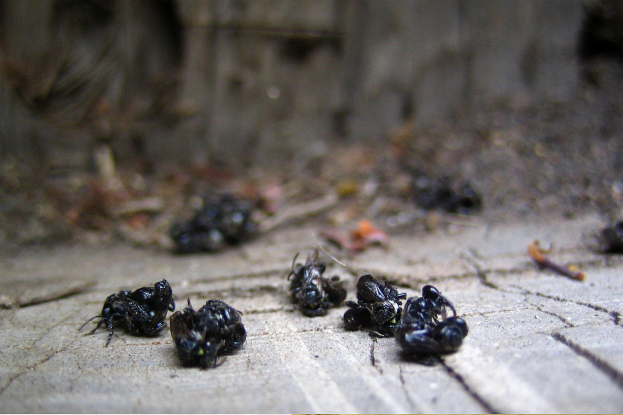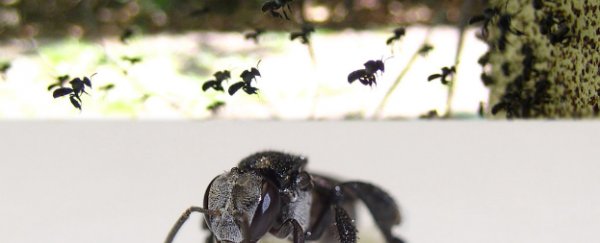Forget Game of Thrones, Australia's native bees have mastered the art of war. New research has found that they sacrifice thousands of worker bees in month-long battles in order to take over neighbouring hives.
Australia's native sugar bag bee, Tetragonula carbonaria, is well known around the Australian city of Brisbane for forming large fighting swarms around this time of year. However, up until now, nobody really knew what the purpose of these swarms were.
Now new research led by Dr Paul Cunningham from Queensland University of Technology and Dr James Hereward from the University of Queensland, both in Brisbane, has revealed the objective and scale of these violent wars for the first time in the journal American Naturalist.
The research team spent five years watching battles around Brisbane, and saw 46 of these all-or-nothing take-overs - and they're even more epic than they imagined.
Using genetic analysis, they revealed that the bees wipe out the defending army so that their troops can storm the hive and place their own queen on the throne to rule. And they're not just fighting amongst themselves, they're also taking on other species.
These brutal bee wars can take weeks and even months, the study revealed, with wave after wave of suicidal worker bees being sent in to break down the numbers of the defending hive - leaving a carpet of thousands of dead and dying bees on the ground (as you can see in the footage below).

Though they do not have a sting, the bees use their strong jaws to lock onto each other in mortal combat - something that results in both fighters eventually dying.
"Neither the attacker nor defender survives these lethal contests," said Dr Cunningham in a press release. "So in the end, it comes down to a sheer numbers game as to who wins."
In their close examination of a fight outside one hive, the researchers made another new discovery - these bees don't just fight amongst themselves, they fight with their cousins. The battle they were witnessing was an attack and take-over of a Tetragonula carbonaria hive by the related species Tetragonula hockingsi, which originates from further north of Brisbane.
"It took three consecutive attacks over several months before the hockingsi bees won out," said Dr Cunningham. "When they eventually broke through the defences, they smothered the hive in a huge swarm, mercilessly ejecting the resident workers, drones and young queens. It was carnage!"
Several months after the attack, the researchers opened up the hive and analysed the genes of the new owners.
"There was a new queen in residence, and she was a daughter of the attacking colony's queen," said Dr Cunningham in the release. As he told Jonathan Webb from BBC: "These bees were playing a Game of Thrones."
 Image: QUT
Image: QUT
Australian native bees are important pollinators, and the scientists are hoping their research will help better understand the ecology and behaviour of these little insects.
"We still have many questions to answer, such as what instigates the attacks, and whether the young in the usurped hive are spared and reared as slaves, or killed outright," Dr Cunningham said.
Well, we guess this is just further proof that even the most innocent looking Australian animals have a dark side.
Want to study science? Check out QUT's world-leading courses and facilities.
